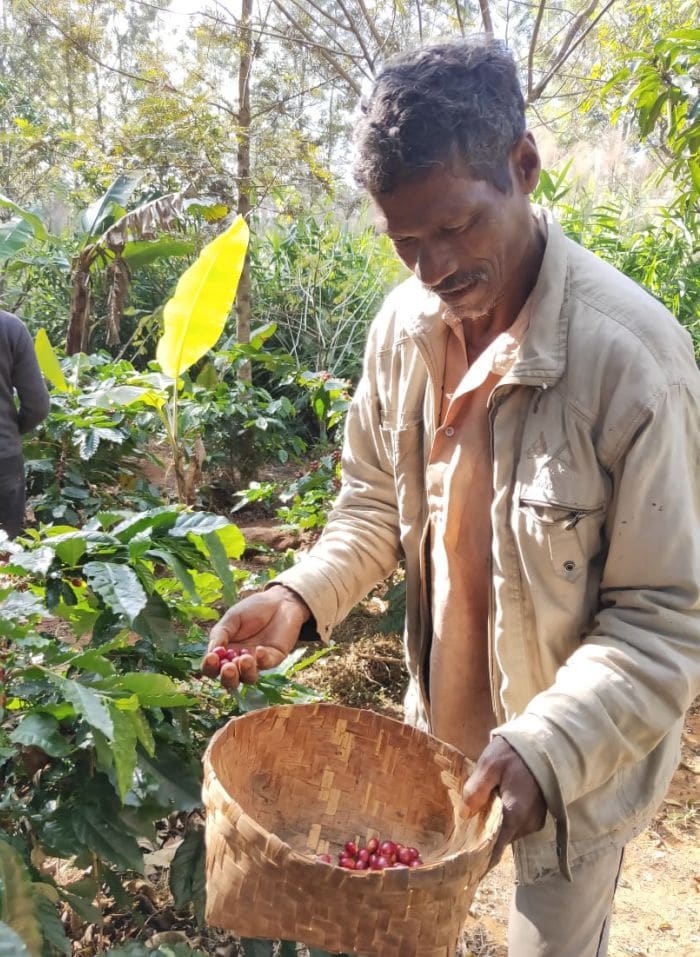
Tucked away about 115 kms from Visakhapatnam, the little town of Araku maybe popularly known as a hill station, but that's not the only attraction of this picturesque region. Notice the green cover around and you will soon discover that Araku is a coffee growing region in India. On our short trip to Araku we learn that under Naandi Foundation, the Araku project has been transforming the lives of 100,000 Adivasi farmer families and making the region famous for its world-class coffee. We meet David Hogg, Chief Agriculture Advisor of Araku Coffee and his team to watch all the action first hand.
"Feel this soil sample and how rich it is in moisture," says David Hogg as we spend the afternoon at the CPU (Central Processing Unit) of Araku Coffee. Having lived in Karnataka for almost a decade and visited coffee growing regions like Coorg, Wayanad and the Nilgiris multiple times, I am convinced that I already know the basics of coffee production. In fact, the sole purpose of my trip to the unexplored Araku hill station in Andhra Pradesh is to witness the coffee harvest, which has a limited window of about three months for the Arabica variant. It's mid January, and I am just in time to catch the action. But that's not the only takeaway. Post a few conversations with David, suddenly the excitement shifts from tasting fresh coffee berries to the very root cause - the soil, as the realisation seeps in that I have much to learn.
We are in a thatched hut and the floor is segregated into multiple sections, each containing varying soil samples. David schools us on the importance of organic carbon and the role it plays in not just improving the quality of the coffee beans and the plants but also fighting global warming. His passion for clean agriculture is evident as he talks in length about soil and manure and the miracles they can create for crops sans any chemicals. Each sample we examine is 100% organic manure, made with a mix of cow dung, crop residues and other natural ingredients. It doesn't end there. David goes on to unearth what he calls a horn, which we discover is an earthen cone filled with a mix of bio active ingredients - another of his methods of developing rich manure. It's incredible to watch the tremendous care and effort being put into developing manure that are then handed over to the farmers for free.
With David monitoring coffee quality from production to cup for Araku Coffee, it's not just about inspecting the coffee beans, its aroma and flavour profiles as one would assume. He and his team of passionate farmers spend much of their time building strategies for developing fertile soils through unique organic farming methods, which have been showing great results by means of superior quality coffee beans.
Joining In The Coffee Harvest At Araku
What makes coffee harvest season a great time to visit the plantations is the sight of the plump red berries and how marvellously they add colour to the landscape. Plus you get to relish the sweet nectar of the fruit of course. We start by visiting one of the villages from one of the 11 mandals that constitute the Paderu Tribal Agency (PTA), which works under the state government for socioeconomic development of the Adivasi communities. Araku is home to many Adivasis, who are today proud coffee farmers.
Trekking up the hills, deep into the lush plantation, we get to watch harvesting in full swing. Then with cane baskets in our hands, we carefully learn to pick the ripest berries as demonstrated by the farmer. Venkata Rao R., our guide and head of community connect for the Naandi Foundation, shares insights into the training given to the farmers to pick the best berries that in turn fetch them the best prices. There's a whole system put in place, right from harvesting the berries to the final product - roasted coffee beans.

A farmer harvesting coffee berries

The harvested berries that then go for processing
Just like a vineyard, Araku Coffee too applies the principles of terroir in the production of coffee. Each plot of plantation is classified according to terroir, which David tells us is critical in producing quality coffee as it helps in continual soil up-gradation and restoration of microbial life. Based on this, Araku produces different kinds of coffee for the global and Indian markets. Currently in India, Araku Coffee is available online with four customised variants.

Araku offers four coffee variants in India
Araku's Signature coffee symbolises the aromatic balance and fullness of Araku coffees. It has chocolate, spice, and herbaceous aromas. Araku Selection is a particularly strong and full-bodied coffee with a subtle hint of bitterness. It has butter and spice aromas. Coming from few micro estates of same terroir and one uninhabited bio-diverse island, Micro Climate is full-bodied with bold notes verging on fruity, almost caramelised, with a touch of bitterness. Araku Grand Reserve represents the perfect balance between fullness and intensity. It exhibits complex notes of berry and citrus, spices, caramel, vanilla, and leather.
Having witnessed the whole cycle - from coffee harvest to roasting of the beans, it leaves a feeling of amazement at the tremendous effort put into producing the perfect cup of coffee. With the rise of coffee roasters across the country, we are certain that this is the time for Indian coffee brands to take centre stage.
Track Latest News Live on NDTV.com and get news updates from India and around the world

